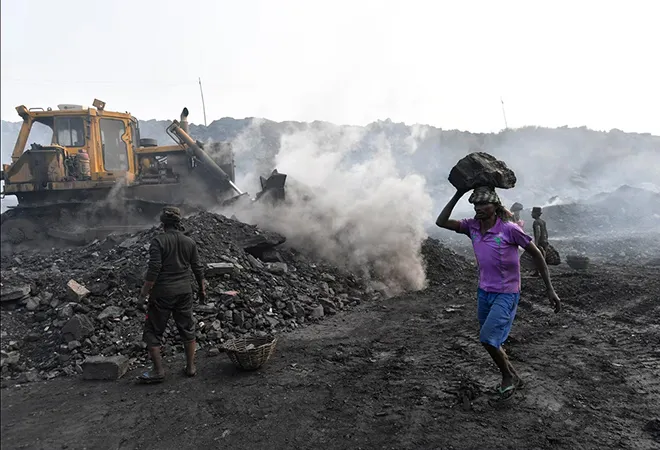-
CENTRES
Progammes & Centres
Location
The current Just Energy Transition Partnerships framework does not work for India because it prioritises G7’s agenda and overlooks our specific energy transition needs and challenges

The coal sector in India employs an estimated 3.6 million people (direct and indirect), compared to around 100,000 workers in South Africa.The nature of India’s coal economy does not lend itself to the existing structure of JET-P deals. The coal sector in India employs an estimated 3.6 million people (direct and indirect), compared to around 100,000 workers in South Africa. The impact of an unplanned transition would be substantially larger in India. Moreover, JET-P benefits are unlikely to reach the more vulnerable informal, low-income, and non-unionised workers in the sector. Finally, the current JET-P relies heavily on loans, which are not well suited to address the social aspects of the transition. Providing alternative livelihoods for coal workers will necessitate an economic transformation of coal-dependent districts and re-skilling of coal workers, which will require grant-based and concessional financing. The G7 countries will continue to struggle to reach a deal with India unless they can reimagine what constitutes “just” and what may be an optimal “transition”. To resolve this, there is a need to preserve the ethic of animating JET-Ps while being open to operationalising these in discreet ways for specific geographies. The focus, therefore, must be on deploying funds to enable transformative change that complements existing decarbonisation efforts, creates the maximum bang for the buck, and crowds in a flow of capital larger than the footprint of the scheme. And most importantly, rather than obsessing with coal, CO2 reduction must become the principal outcome. For example, deploying even about $20 billion for a deal to phase out a few coal plants in India would only result in a small mitigation impact, and this, too, may fade in relative terms as funding dries up. The budgeted outlays could instead be deployed in other ways for more compelling outcomes. India is showcasing great ambition in decarbonising several sectors of the economy. A similar amount deployed in these sectors can have a transformative impact by crowding in additional capital that aligns with India’s development agenda. This would also help position India as a solution provider for these sectors for other developing and emerging economies. Two areas, in particular, hold much promise for such a reconceptualised JET-P.
A JET-P for this sector could have a catalytic effect by directing funding towards augmenting R&D and developing a manufacturing base for climate-friendly technologies.The cooling sector is one of these. Cooling demand in India is expected to increase eight-fold by 2038 as affordable thermal comfort will be closely linked to the achievement of the Sustainable Development Goals. The World Bank estimates that a green cooling pathway could unlock a $1.6 trillion investment opportunity by 2040 with the potential to create a massive 3.7 million jobs. A JET-P for this sector could have a catalytic effect by directing funding towards augmenting R&D and developing a manufacturing base for climate-friendly technologies. India’s Cooling Action Plan would be boosted further by such financial flows. Electric mobility is the second big opportunity. In 2022, India hit a million electric vehicle sales for the first time and is expected to become a $100-billion industry by 2030. India already has multiple policies in place to create a complete EV ecosystem, covering vehicle manufacturing, batteries, and charging infrastructure. A JET-P could look to aid these efforts and channel investments to nascent EV segments, such as long-distance freight and passenger transport. JET-Ps could also explore options to utilise grant-based funding for the reskilling of millions of workers currently employed in the ICE ecosystem. In sum, the G7 should adopt a smart and country-specific approach. Instead of using JET-Ps to further its own agenda, it must look to prioritise the delivery of transformative agreements that align with the recipient countries’ objectives for significant and lasting impact.
The views expressed above belong to the author(s). ORF research and analyses now available on Telegram! Click here to access our curated content — blogs, longforms and interviews.

Promit Mookherjee was an Associate Fellow at the Centre for Economy and Growth in Delhi. His primary research interests include sustainable mobility, techno-economics of low ...
Read More +
Samir Saran is the President of the Observer Research Foundation (ORF), India’s premier think tank, headquartered in New Delhi with affiliates in North America and ...
Read More +